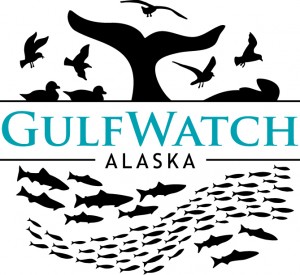 ©2020 Biological and Chemical Oceanography Data Management Office.
©2020 Biological and Chemical Oceanography Data Management Office.Funded by the U.S. National Science Foundation
Gulf Watch Alaska is the long-term ecosystem monitoring program of the Exxon Valdez Oil Spill Trustee Council. After extensive restoration, research, and monitoring efforts in the two decades following the Exxon Valdez oil spill (EVOS), scientists and the EVOS Trustee Council recognize that full ecological recovery from the spill will take decades. Long-term monitoring of the spill-affected resources is important for assessing the recovery of injured species, and for managing those resources and the services they provide. The Gulf Watch Alaska program aims to provide sound scientific data and products that inform management agencies and the public of changes in the environment and the impacts of these changes on injured resources. The program includes projects that monitor macroalgae, invertebrate, and vertebrate species associated with the intertidal zone of nearshore communities; environmental drivers measured by physical oceanography and plankton; and marine birds, whales, and forage fish associated with the pelagic zone in the northern Gulf of Alaska.
Since its inception in February 2012, the program has developed, and will continue to sustain, long-term time series data about the EVOS-affected regions of the Gulf of Alaska. These data are synthesized into products to assist management actions, inform the public and guide further monitoring priorities for the next 15 years. These goals are accomplished by leveraging partnerships with outside agencies and groups to integrate data and expand capacity through collaborative efforts. Additionally, the Gulf Watch Alaska program is synergized with the EVOS Trustee Council-funded Herring Research and Monitoring program, based in Prince William Sound, to develop a better understanding of the marine ecosystem and injury and recovery from oil spills.
| Funding Source | Award Number |
|---|---|
| Exxon Valdez Oil Spill Trustees Council (EVOSTC) | 19120114 |

Principal Investigator: Mandy Lindeberg
National Oceanic and Atmospheric Administration - Alaska Fisheries Science Center (NOAA-AFSC-Auke)
Co-Principal Investigator: Donna Aderhold
National Oceanic and Atmospheric Administration (NOAA)
Co-Principal Investigator: Mayumi Arimitsu
United States Geological Survey (USGS)
Co-Principal Investigator: Heather Coletti
National Park Service (NPS)
Co-Principal Investigator: Katrina Hoffman
Prince William Sound Science Center (PWSSC)
Co-Principal Investigator: Russell R. Hopcroft
University of Alaska Fairbanks (UAF)
Co-Principal Investigator: Robert Suryan
National Oceanic and Atmospheric Administration - Alaska Fisheries Science Center (NOAA-AFSC-Auke)
Contact: Mandy Lindeberg
National Oceanic and Atmospheric Administration - Alaska Fisheries Science Center (NOAA-AFSC-Auke)